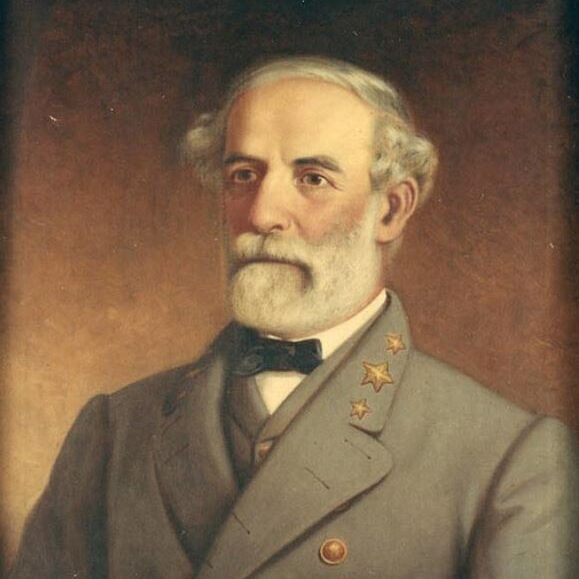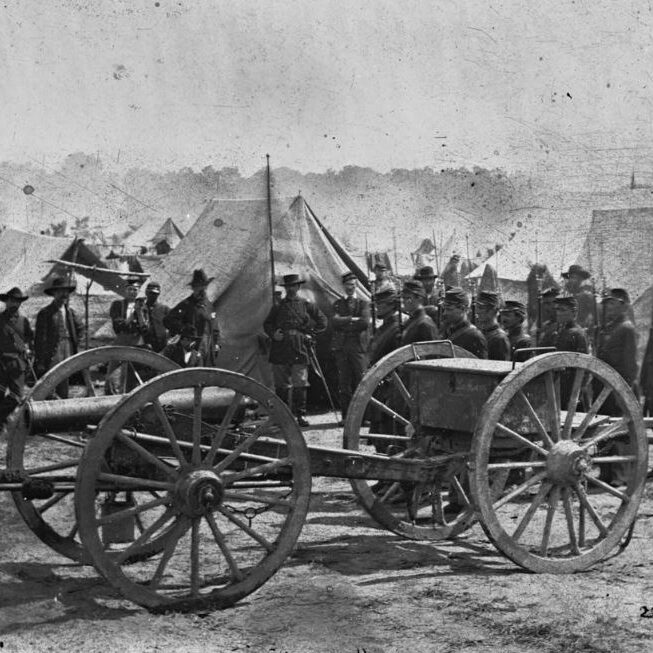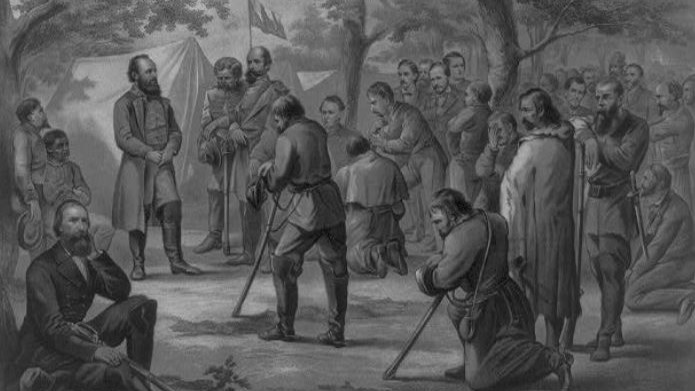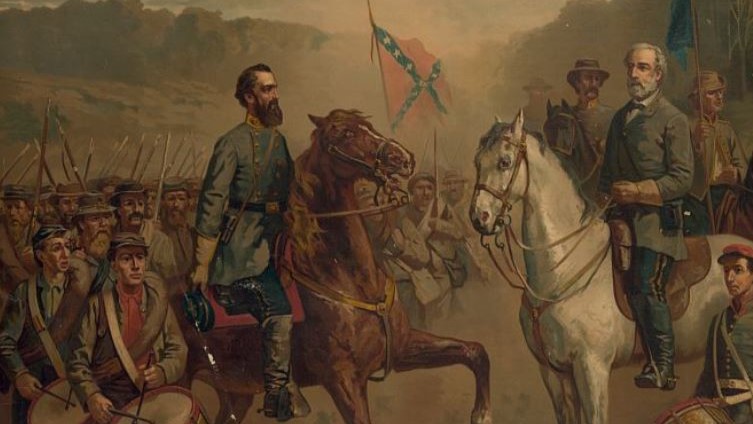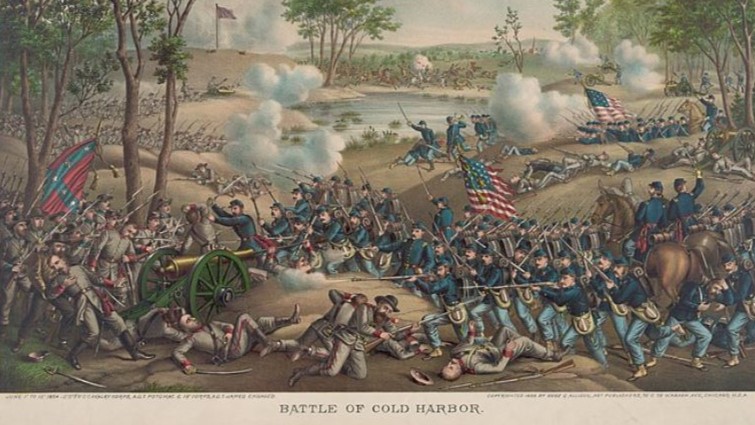General Robert E. Lee was a celebrated military leader in the United States Army. But why did he choose to join the South in the Civil War?
General Robert E. Lee was Revered for his tactical brilliance, as he led the Confederate Army of Northern Virginia for much of the conflict.
Lee was a man of honor and duty. However he was gripped by conflicting loyalties – to his home state of Virginia and to the United States, a nation he had served for decades.
In this article, we seek to understand the complexities surrounding General Robert E. Lee’s choice and how this sheds light on the deep divisions that tore the United States apart during the Civil War.
1. Robert E. Lee: A Man of Duty and Honor
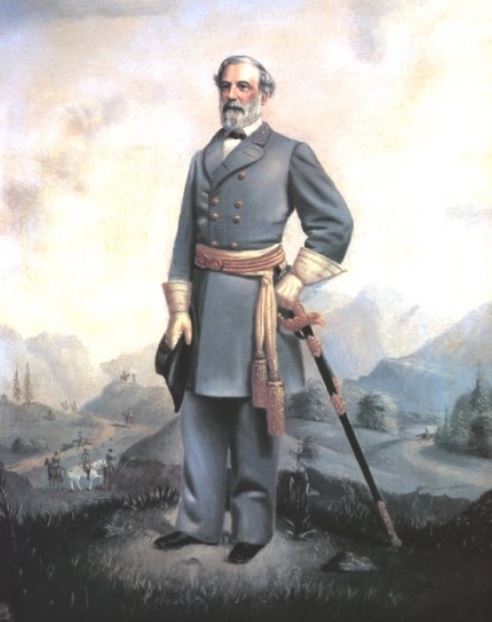
Robert E. Lee’s decision to side with the Confederacy in 1861 was shaped by his upbringing and personal code of honor and duty. From a young age, Lee was instilled with a strong sense of loyalty to his family, the State of Virginia, and the notion of selfless service.
An Aristocratic Virginia Upbringing
Born in 1807 at Stratford Hall Plantation in Virginia, Lee grew up immersed in the values of the Southern aristocratic class.
His father was a Revolutionary War hero and governor of Virginia.
General Robert E. Lee’s maternal heritage traced back to the prestigious Virginian Randolph and Custis families.
This environment cultivated Lee’s belief in concepts like personal honor, deference to authority, and cultural traditions of the Southern gentry. Loyalty to one’s home state and its interests took precedence over allegiance to a broader, more abstract national union.
Decades of Service to the United States
Despite his ingrained Southern roots, Lee chose to pursue a military career serving the United States after graduating from West Point in 1829.
For over 30 years, he distinguished himself as an exceptional officer, fighting for the U.S. in the Mexican-American War and receiving praise for his leadership.
Lee’s dedication to duty within the U.S. military framework was unwavering during this period. He turned down opportunities for higher profits in the private sector, exemplifying his commitment to national service over personal gain.
An Agonizing Internal Struggle
Yet when the crisis over slavery and states’ rights erupted in 1861, General Robert E. Lee found himself torn between two competing loyalties:
- His sworn oath as a U.S. Army officer; and
- His lifelong attachment to the sovereignty of his home state of Virginia.
In letters, General Robert E. Lee agonized over the difficult choice he faced. He personally opposed secession and the fracturing of the United States. However, he stated:
“I cannot raise my hand against my birthplace, my home, my children.”
General Robert E. Lee
General Robert E. Lee’s decision to join the south revealed how his ingrained ethics of state loyalty and honor outweighed his more recent oath of allegiance to the federal government. It was an incredibly complex personal struggle for a man renowned for his character and sense of duty.
2. The Pull of Virginia
While the decision to take up arms against the United States was an immensely difficult one for Lee, the intense gravitational pull of loyalty to his native Virginia ultimately made his choice inevitable.
In the South of the 1860s, allegiance to one’s state took precedence over allegiance to the federal Union.
State Sovereignty in the Antebellum South
In the decades before the Civil War, the concept of “state rights” and local sovereignty reigned supreme in Southern political thought.
Most southerners regarded their state as their true “country” – the national government was viewed as a secondary, limited union of sovereign states.
When disunion arose in 1861, the priority of state over nation was an entrenched part of the Southern identity that men like Lee inherited.
Virginia’s Fateful Secession
Virginia’s secession from the Union in 1861 was a culmination of several factors that had been simmering for decades.
The election of Abraham Lincoln, who opposed the expansion of slavery, in 1860 was seen by many Southerners as a direct threat to their way of life. They feared Lincoln would abolish slavery or restrict its expansion, jeopardizing the Southern economy and social order.
In response to Lincoln’s election, Virginia convened a secession convention in February 1861. Initially, the convention voted against secession, but the mood shifted after Lincoln called for troops to retake Fort Sumter in South Carolina, which had already seceded.
Many Virginians felt a strong sense of loyalty to their state and believed they had a duty to defend it. The call for federal troops to retake a Southern fort was seen as an act of aggression.
On April 17, 1861, after Lincoln’s call for troops, the Virginia Secession Convention voted to leave the Union. The vote was narrowly divided, reflecting the deep internal struggle within Virginia.
Fighting for Virginia, Not Just the Confederacy
As a native Virginian from an elite planter family, immense pressure mounted on Lee to resign his U.S. Army commission and serve the interests of his state. Days later, he stepped down from the U.S. military.
Importantly, General Robert E. Lee’s motivations centered more on defending Virginia than actively revolting against the federal government or promoting the Confederate cause of preserving slavery and white supremacy.
In a letter to his sister in April 1861:
The whole south is in a state of revolution, into which Virginia, after a long struggle, has been drawn; and, though I recognize no necessity for this state of things, and would have forborne and pleaded to the end for a redress of grievances, real or supposed, yet in my own person I had to meet the question whether I should take part against my native state.
With all my devotion to the Union and the feeling of loyalty and duty of an American citizen, I have not been able to make up my mind to raise my hand against my relatives, my children, my home. I have therefore resigned my commission in the Army, and save in defence of my native state
General Robert E. Lee
In early 1861, after several Southern states had seceded, Jefferson Davis, President of the newly formed Confederate States of America, offered Robert E. Lee a commission as a major general in the Confederate Army.
He eventually resigned his commission in the U.S. Army on April 20, 1861, shortly after Virginia seceded. A few days later, he accepted the commission offered by Jefferson Davis and joined the Confederate Army.
3. Robert E. Lee: A Complicated View on Slavery
General Robert E. Lee held views on slavery that reflected the contradictions of his time.
Disapproval of the Institution
In letter to his wife where General Robert E. Lee describes slavery as a “moral and political evil.” Lee’s use of the term “moral evil” is a strong condemnation. It suggests he recognized the inherent injustice and cruelty of the institution.
This differs from the stance taken by many Southerners of time who sought to preserve this institution.
General Robert E. Lee’s disapproval, while significant, may not have been as radical as abolitionists. His views fell somewhere in the middle, acknowledging the wrongness of slavery but unwilling to disrupt the social order by advocating for its immediate end.
Robert E. Lee’s Paternalistic View of Race
Robert E. Lee’s stance on slavery presents a fascinating historical paradox. While personal letters reveal his disapproval, he saw this practice through the lens of paternalism, a common Southern ideology.
Paternalism positioned white Southerners as benevolent guardians of enslaved people.
General Robert E. Lee believed they were “better off” than in Africa.
He likely ignored the forced separation of families, the physical and psychological abuse, and the denial of basic human rights.
This paternalistic outlook allowed him to reconcile his religious beliefs in equality with the economic advantages his family derived from owning slaves.
Further complicating the issue, General Robert E. Lee held a belief in divine resolution. He believed God, not human action, would determine slavery’s fate. This stance absolved him of personal responsibility for dismantling the system. It likely also stemmed from a desire to avoid the fierce political debates and social unrest abolitionism ignited.
Paternalism ultimately failed to address the core issue of human bondage and limited the agency of enslaved people.
General Robert E. Lee’s perspective might have reflected a desire to avoid political conflict. The issue of slavery was already incredibly divisive in the years leading up to the Civil War. Lee, perhaps fearing the consequences of political action, opted for a more passive approach.
Managing Inherited Slaves at Arlington
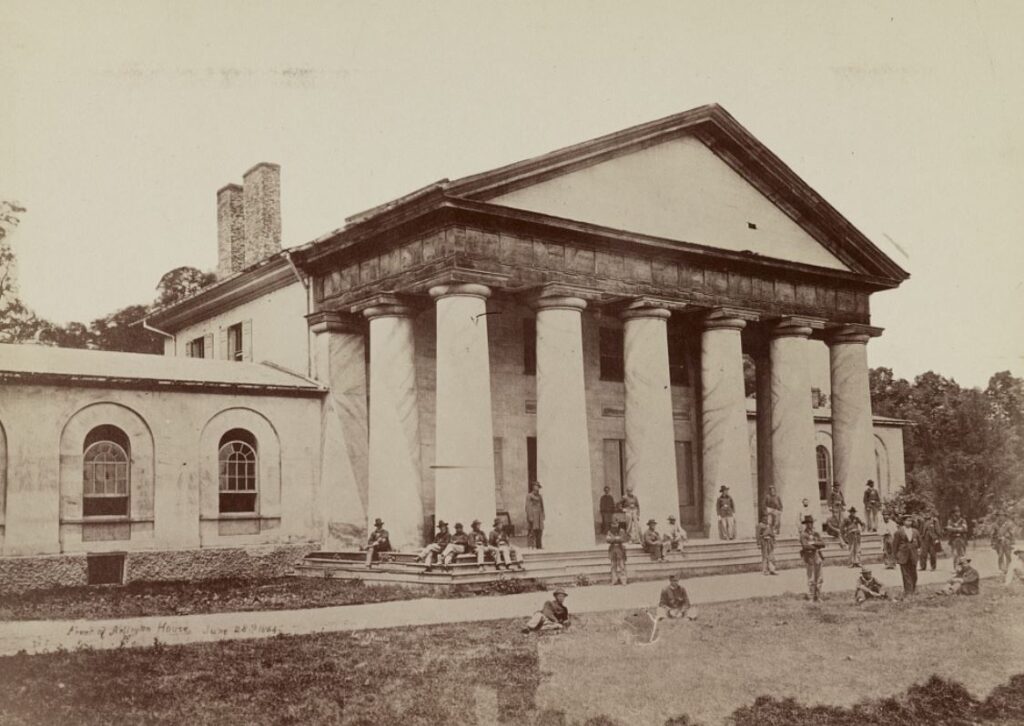
General Robert E. Lee inherited enslaved peoples from his father-in-law, George Washington Parke Custis.
Following Custis’ death in 1857, General Robert E. Lee found himself responsible for nearly 200 enslaved people at Arlington. This inheritance presented a significant challenge.
While Lee may not have personally endorsed slavery, the economic realities of the South forced him to make difficult decisions.
Custis’ estate was in disarray, burdened with significant debts.
General Robert E. Lee had a desire to preserve the estate and provide for his family, but he needed to find ways to generate income. This placed him in a bind – his personal reservations about slavery clashed with the economic necessity of exploiting slave labor.
A more controversial decision was Lee’s practice of hiring out slaves to other plantations. This practice, while common in the South, separated families, subjected slaves to potentially harsher conditions, and ultimately undermined any promises of improved living situations at Arlington. His enslaved persons would have felt betrayed by Lee’s actions, which directly contradicted any perceived improvements he may have on the estate.
In late spring of 1859, three enslaved people at Arlington – Wesley Norris, his sister Mary, and their cousin George Parks – made a daring escape. This act of defiance directly challenged Lee’s control and highlighted the desperation some slaves felt, even under a potentially “benign” owner like Lee.
The escape attempt at Arlington serves as a microcosm of the larger struggle between enslaved people and their owners. Even for those who expressed reservations about slavery, the reality of maintaining control over a potentially rebellious workforce necessitated harsh measures.
General Robert E. Lee and John Brown’s Raid
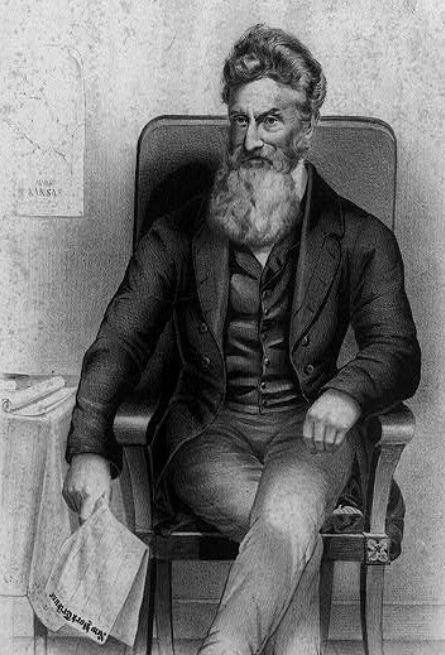
In 1859, abolitionist John Brown’s raid on Harpers Ferry, Virginia, sent shockwaves through the nation.
This audacious attempt to incite a slave rebellion brought Colonel Robert E. Lee, face-to-face with the growing tensions over slavery.
Brown’s raid targeted a federal arsenal and aimed to spark a violent uprising. Robert E. Lee believed in preserving the Union and disliked abolitionist tactics.
Robert E. Lee was called upon to quell the raid. His successful capture of Brown and his followers solidified his image as a capable military leader.
Brown’s failed raid, while ultimately unsuccessful, had a profound impact. For Lee, it became a turning point. The event likely fueled his anxieties about the future of the Union and the growing power of abolitionism.
4. General Robert E. Lee’s Difficult Choice

As tensions between the North and South rapidly escalated in early 1861, Robert E. Lee found himself facing an excruciating personal decision – one that would fundamentally shape the trajectory of the looming Civil War.
In March 1861, Lee attended a reception for officers at the White House, where he met with newly-elected President Abraham Lincoln.
Recognizing Lee’s wavering allegiance, Lincoln made an explicit effort to keep him loyal, offering him a prestigious position as Colonel of the 1st U.S. Cavalry Regiment.
However, events quickly outpaced Lincoln’s overtures.
On April 12th, Confederate forces under P.G.T. Beauregard opened fire on the U.S. military garrison at Fort Sumter in Charleston, South Carolina after Lincoln attempted to resupply the federal outpost. This marked the first shots of the Civil War.
With his home state of Virginia’s secession imminent, Lee was directly questioned by General Winfield Scott and given an ultimatum – either take an oath of allegiance to the Union cause or resign his commission in the U.S. Army.
On April 20th, 1861, the agonized Lee tendered his resignation to the military he had served for over three decades.
Joining the Confederacy
Arriving in Richmond on April 23rd, Lee was appointed commander of the Virginia state forces by the secession convention.
But to his surprise, he was then summoned to meet with Confederate President Jefferson Davis, who revealed he intended to make Lee commander-in-chief of the entire Confederate armies.
Indeed, within a month Union forces crossed the Potomac River and occupied parts of Northern Virginia, including Lee’s beloved family estate at Arlington. The mansion was seized by the federal government and turned into military headquarters.
5. Legacy and Remembrance
Robert E. Lee’s decision to resign from the U.S. Army and take up arms against his former nation continues to be a controversial and hotly debated aspect of his legacy over 150 years later.
To some, Lee’s choice represents an unforgivable betrayal of his sworn oath and the moral and legal cause of preserving the United States.
To others, he is celebrated as an honorable man who upheld longstanding principles of state sovereignty and individual duty.
Fairly evaluating Lee’s path requires understanding the social and cultural context in which he operated. In the 1860s, unquestioned allegiance to one’s state and its interests trumped allegiance to a distant federal authority for many in the South.
States’ rights and local governance loomed larger than abstract notions of inviolable national union.
So while Lee’s military leadership for the Confederacy enabled the tragic prolongation of the Civil War, his motivations seem more rooted in honor rather than an insurrectionist.
Further Reading
If you enjoyed this article, you may be interested to read more about the American Civil War events, or perhaps read about the bloodiest battles of the Civil War or the South’s important victories. Read here for more general American history.

